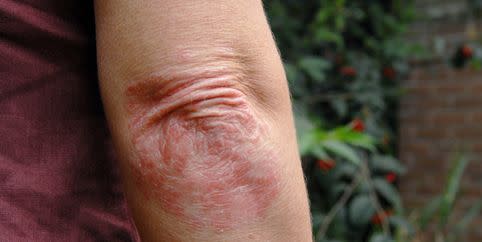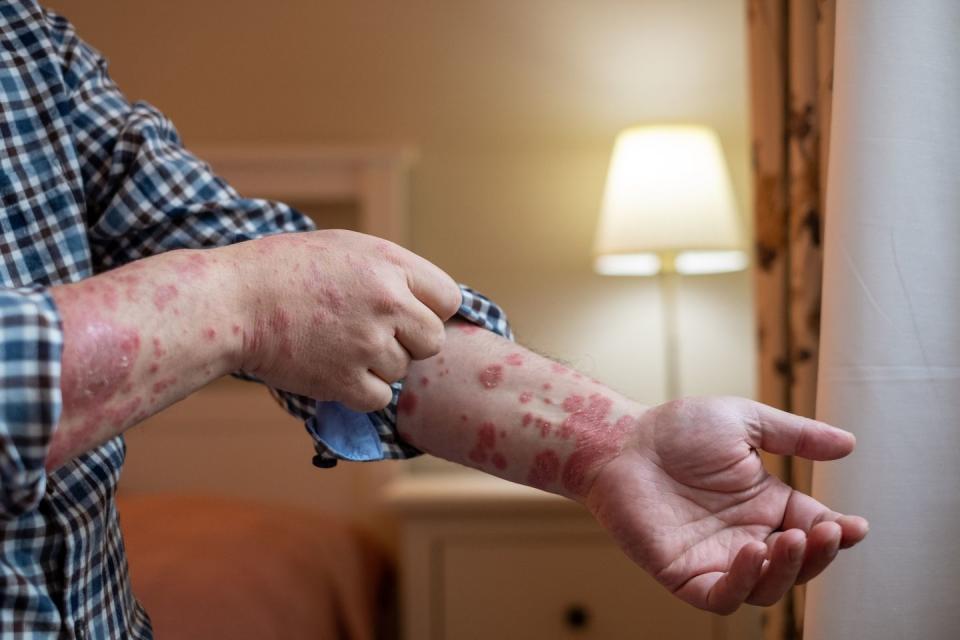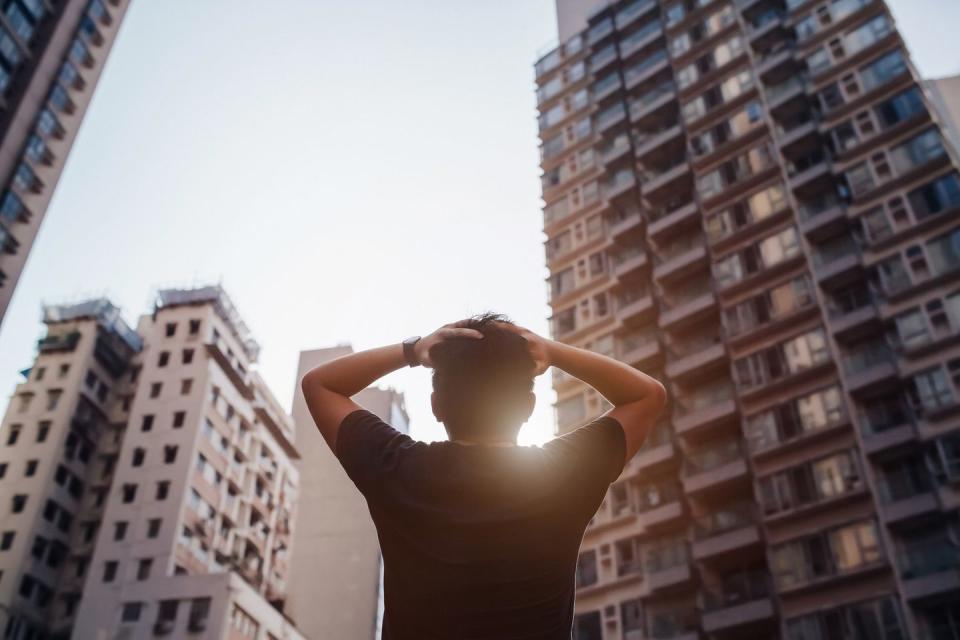6 Habits That Could Be Making Your Skin Worse


If you have psoriasis, you know just how frustrating the condition can be. The most common type of psoriasis, plaque psoriasis—thick, reddish patches of skin with silvery scales—can also pop up at a moment’s notice and stick around for months.
For the 7.5 million Americans who have this chronic inflammatory disease, an overactive immune system speeds up skin cell growth, leading to patches of skin that can itch or feel sore.
Your genes may put you at risk for psoriasis, but environmental factors including lifestyle moves can make symptoms worse.
The good news: “Many people know what makes their psoriasis worse. And if they know it, that’s great, because they can avoid it,” says Adnan Nasir, M.D., Men’s Health advisor and a dermatologist in Raleigh, NC. Not sure what’s causing your flares? It could be one of these six habits to drop.
Habit #1: Popping ibuprofen like it's candy
Non-steroidal anti-inflammatory drugs (NSAIDs) like Aleve, Motrin, or ibuprofen might help your muscle soreness but they could also worsen psoriasis. “These anti-inflammatory medications may boost some of the cytokines that aggravate some types of psoriasis,” explains Dr. Nasir.
Some research suggests that topical NSAIDs can irritate the condition, too. If you take ibuprofen every now and then, keep a diary of how your skin feels a few days after. If it’s flaring up, talk to your doctor. It may be that the meds are causing your flare-ups.
Habit #2: Shunning the sun

When it comes to curbing psoriasis flares, it seems a little sun is better than none. UV exposure naturally suppresses immunity. In fact, it’s so powerful in easing symptoms that dermatologists often prescribe phototherapy treatments, in which artificial UVB rays are emitted through a lightbox or hand-held excimer laser. Dr. Nasir notes that, under a microscope, you can tell which area of skin has been exposed to ultraviolet rays because they are lower in immune cells than areas of skin not exposed.
“Topical vitamin D is also a treatment for psoriasis, so we know that sunlight can also help in moderation,” says Corey L. Hartman, Men’s Health advisor and founder and medical director of Skin Wellness Dermatology in Birmingham, AL.
If you opt to catch some rays outside of a controlled setting, practice safe sun behavior, apply adequate sun protection to areas that aren’t affected by psoriasis, and limit your exposure to 10 minutes, especially if you’re on a medication like a biologic, an injectable drug that can suppress your immune system. A sunburn ups the risk of skin cancers, and for some patients, causes the development or worsening of psoriatic lesions. “You don’t want to stay in the sun so much that you start to have other issues, especially if you're in a biologic and your immune system is not functioning fully,” says Dr. Hartman.
Habit #3: Living on junk food
Scientists have long known that obesity and psoriasis go hand-in-hand. But regardless of your weight, the foods you eat matter. This is especially true when it comes to foods that kick up inflammation in the body—cookies, packaged foods, and soda. “There's some indication that the inflammation that goes on in the skin with psoriasis can also indicate inflammation inside the body,” says Dr. Nasir. “So if you have psoriasis, you may be at slightly greater risk for metabolic syndrome.”
In fact, even a short-term spurt of eating a diet high in saturated fat and simple sugars can trigger psoriasis-like inflammation in the body, suggests a 2020 study in the Journal of Investigative Dermatology. While there’s no definitive psoriasis food plan, many sufferers find relief from a balanced diet filled with anti-inflammatory foods—salmon, broccoli, berries, and avocado.
Dr. Nasir says flare-ups can be common after a big dose of gluten (a craft beer or a bagel), too. In fact, one study published in the journal Dermatology and Therapy found that 36 percent of people with psoriasis followed a gluten-free diet to ease their symptoms; more than half of those people noted that going gluten-free improved their symptoms.
Habit #4: Making high-stress your norm

Psychological stress is a known trigger for plaque psoriasis. In fact, a study published last year in the Journal of Personalized Medicine found that stress was considered a potential trigger for 69 percent of psoriasis flare-ups. In that study, while 19 percent of people without psoriasis reported feeling stress over the last month, 45 percent of people with psoriasis reported stress.
Some research indicates an altered hypothalamic-pituitary-adrenal (HPA) axis — a system that works to control stress reactions — in people with psoriasis, something that could impair stress response. Relaxation exercises (relaxing different parts of your body for a few minutes every day, for example) have also been shown to reduce psoriasis severity.
The relationship between stress and psoriasis is complex. Thanks to an emerging field of medicine known as “psychodermatology” there are more providers specializing in the intersection of dermatology and mental health and more research is being conducted.
If you feel as though your psoriasis is causing you stress, consider reaching out to a psychologist or psychiatrist.
Habit #5: Lighting up
Aside from all the obvious reasons it’s unhealthy, smoking ups your psoriasis odds and may make flare-ups more severe. A study in the American Journal of Epidemiology revealed that long-term smokers had nearly double the risk of developing psoriasis as nonsmokers.
The chemicals in regular and e-cigarettes constrict blood flow, which puts the body in a state of stress that can inflame the skin. Nicotine also harms the immune system, causing skin cells to pile up too quickly. Bottom line: It’s as bad for your skin as it is for the rest of you.
Habit #6: Ignoring Excess Fat
Having excess fat on your body—specifically around your midsection—could be bothering your skin. “The cells in fat tissue are not just passive containers that store energy, they are active in manufacturing cytokines, messengers that communicate between immune cells,” says Dr. Nasir. “They make a lot of pro-inflammatory cytokines.” Reduce the number of fat cells? You reduce the burden of these inflammatory cytokines, which is key if you have an inflammatory disease like psoriasis.
One way to do it: High-intensity interval training, which burns more fat than your traditional steady-state cardio. According to a new review of research in the British Journal of Sports Medicine, after three HIIT sessions a week for 12 weeks, each minute of exercise you do is expected to burn an extra 0.13 grams of fat, which could lead to an extra 22 pounds of extra fat loss over 10 years time.
You Might Also Like

